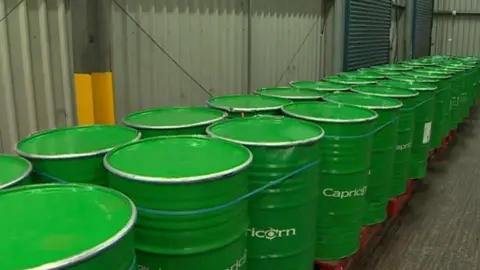Brexit stockpiling: No room at food warehouse in Cardiff
A cold storage firm says it has run out of room because the food industry is stockpiling in the run-up to Brexit.
Cardiff-based Wild Water has rented extra space in Newport, Bristol and Staffordshire, and bought another storage site in Merthyr Tydfil.
It is also building a large facility in Aberbargoed in the Rhymney Valley to help cope with increased demand.
Managing director Ken Rattenbury said customers were "ultra-concerned" about food being held up at ports.
The UK government insisted the country's high level of food security would continue "whether we leave the EU with or without a deal".
Wild Water's Cardiff warehouse has capacity for 17,000 pallets. Across all its storage sites it is storing 40,000 pallets.
The firm is run by Mr Rattenbury and his son Jake. Their customers include food production companies and smaller Welsh producers, as well as supermarkets and High Street stores.
"This is people just holding stock because they're concerned about next year, when we get to March, if there's no deal, they will not be able to get their products here," Ken Rattenbury said.
In the warehouse now
-
1.75m turkey crowns
-
7,000 pallets of cakes
-
4,000 pallets of supermarket desserts
-
2,000 pallets of fruit juice
-
1,000 pallets of Mozzarella sticks
The company stores imported raw ingredients from across the world through to finished food from Welsh producers that is ready to go into shops.
"It's completely out of sync to how we normally are... We're turning businesses away every day, every single day," Mr Rattenbury said.
The Cardiff warehouse has been full to capacity for four months, he said.
The company has now bought a 12-acre former wrapping paper factory in Aberbargoed and is converting it into another cold storage centre, which will cost £1.7m, with £500,000 over five years coming from the Welsh Government. It aims to employ 120 people within 18 months.

Mr Rattenbury said: "I'm 100% confident [this is because of Brexit]... I had meetings this week and people are telling me they're ultra concerned about the borders etc.
"Their stock [can't be] held up at the ports because a lot of it is fresh and so they're looking to freeze it down.
"They're worried about the raw ingredients to be able to make ready meals, they're concerned about flour, they're concerned about juices. Everything you can think of that we use for food. Everybody is looking to stockpile."
A spokeswoman for the Food and Drink Federation said food and drink manufacturers would be looking to guard against the risk of a no-deal Brexit.
"This may include storing increased volumes of ingredients, and chilled and frozen foods," she added.
"While we're aware that larger companies are preparing for a 'no-deal' Brexit, this approach will prove difficult for most [small and medium-sized companies], who do not possess the same level of resource.
"We will not run out of food and drink in a 'no-deal' scenario but there is potential for serious disruption to supplies and this would have implications for product availability and consumer choice."
A UK government spokesperson said: "The UK has a strong level of food security built upon a diverse range of sources including strong domestic production and imports from third countries.
"This will continue to be the case whether we leave the EU with or without a deal.
"We are making sensible preparations for all eventualities as we leave the EU, including the unlikely scenario we reach March 2019 without an agreement, but we are fully focused on achieving a mutually advantageous deal with the EU."